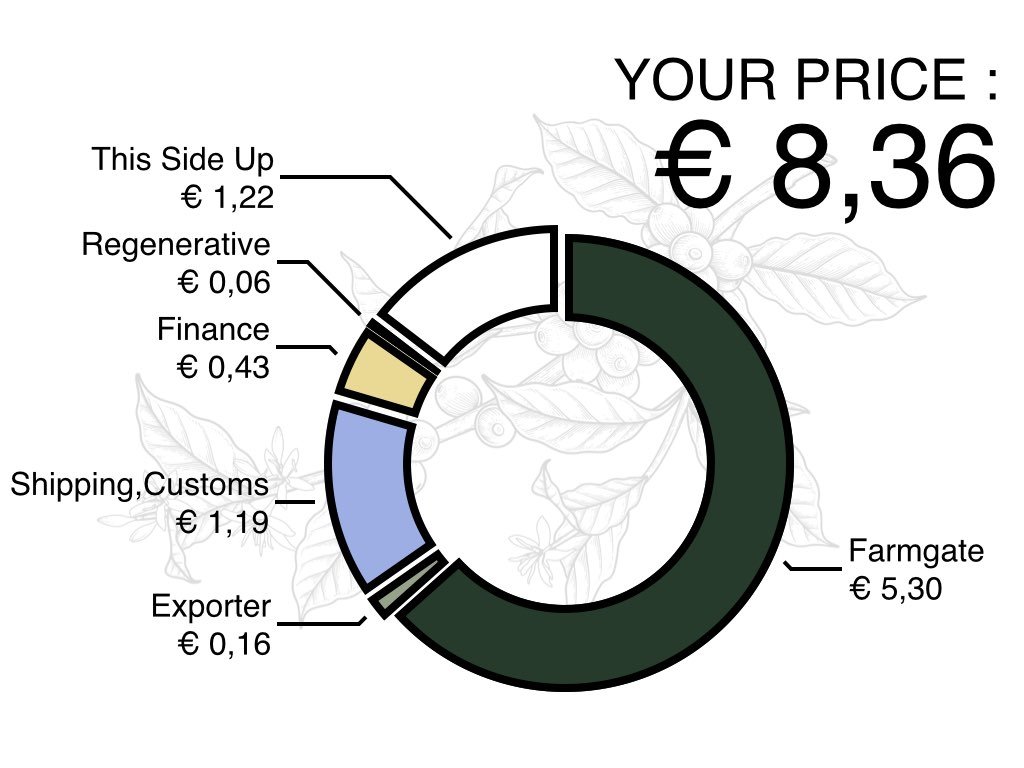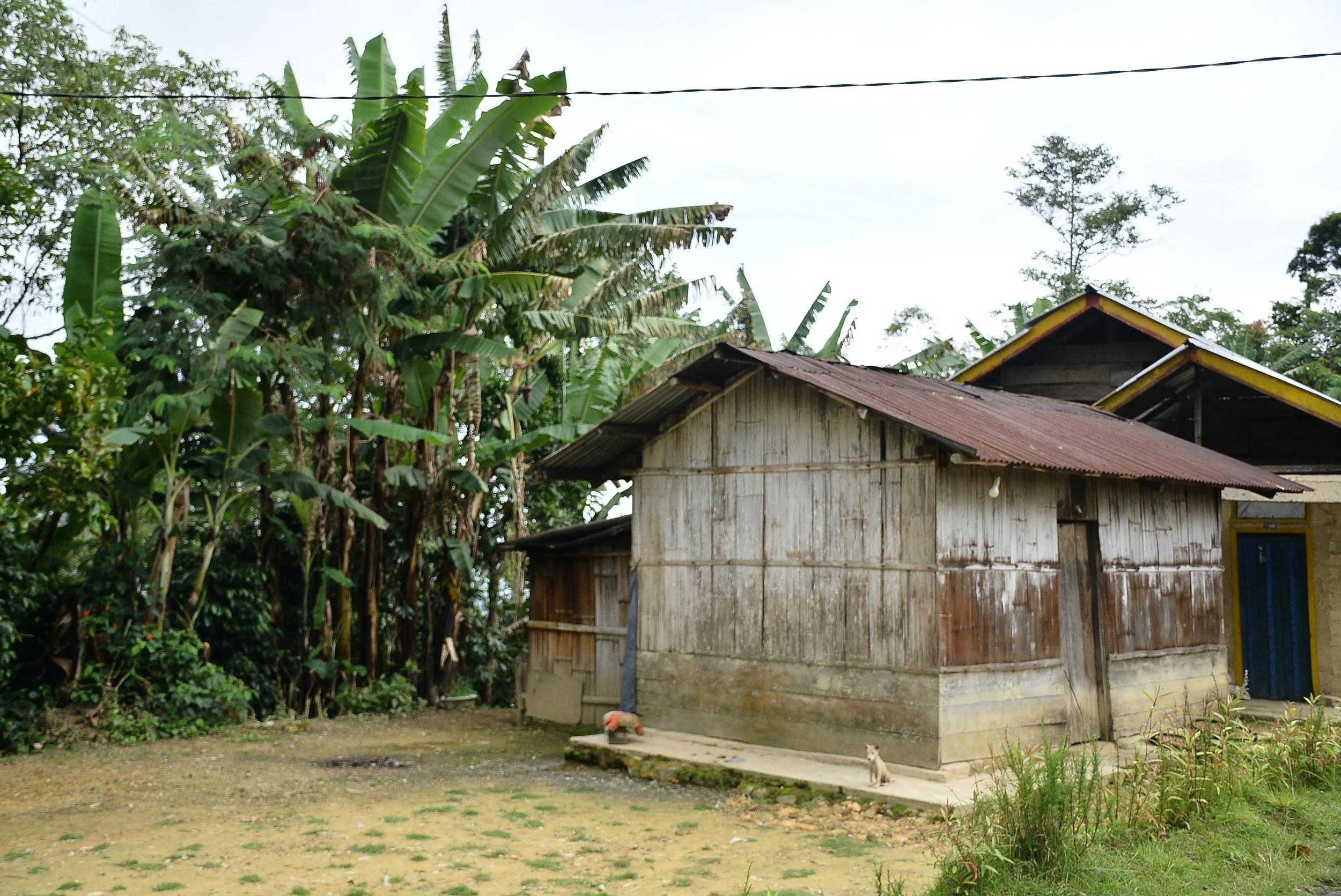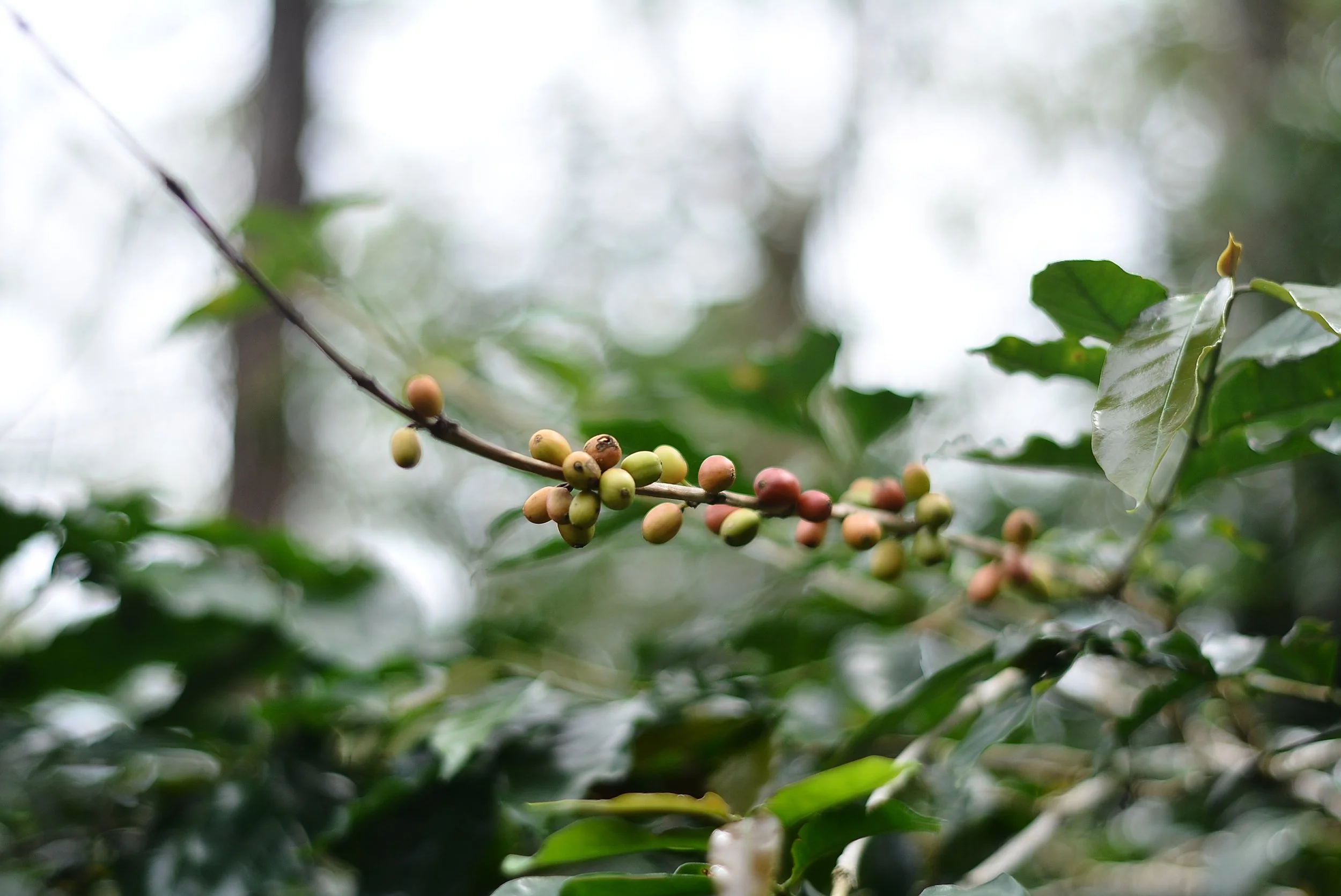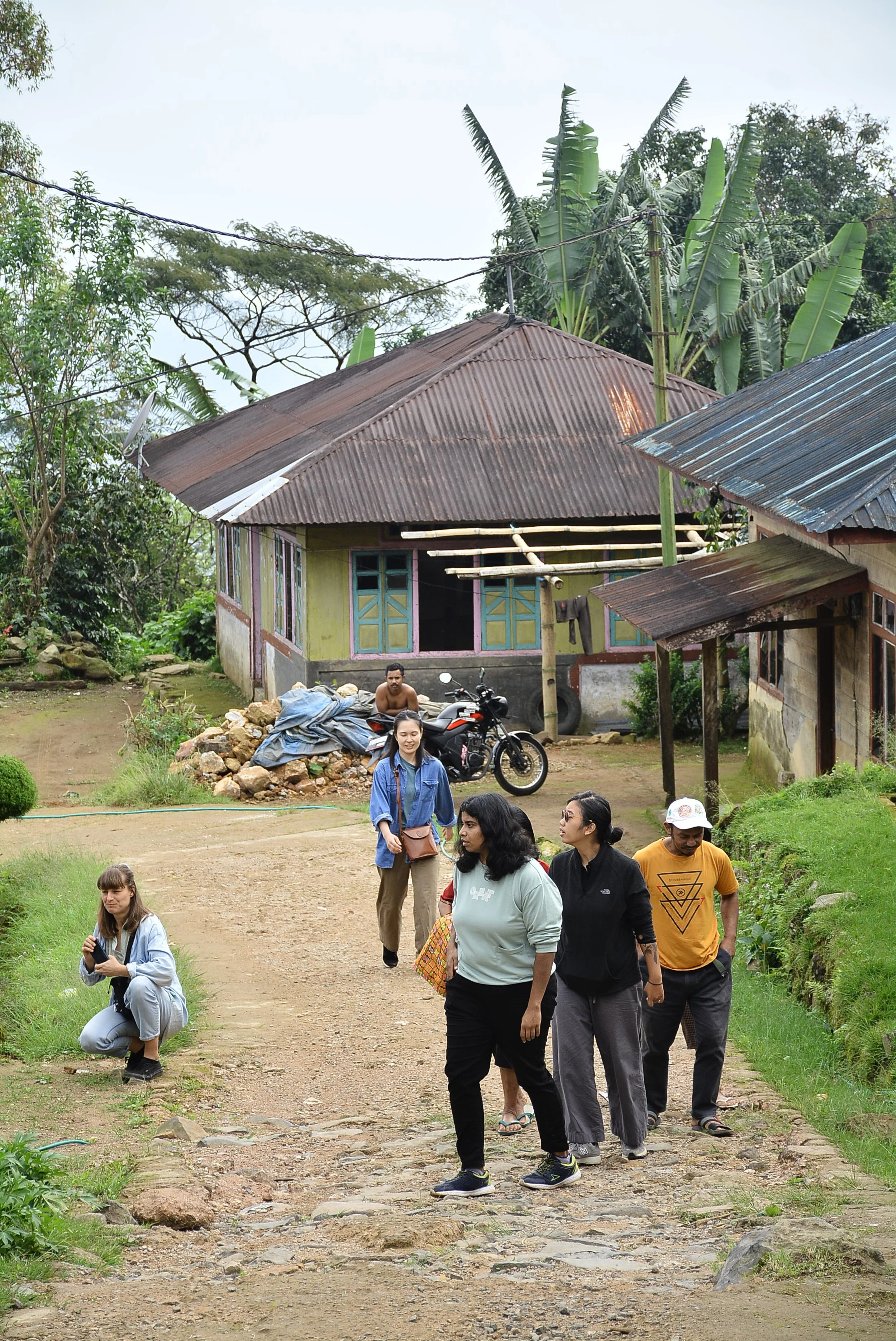ALL THAT GLITTERS IS ROBUSTA
This Speciality Robusta project that began several years ago between ASNIKOM and This Side Up in cooperation with Ontosorroh coffees was developed with an intent to be climate resilient. Robusta being native to Flores and ASNIKOM being prepared to process them according to specialty standards paved way for a unique partnership and product in the market. Initially Adri was playing a supporting role for ASNIKOM translating contracts and negotiating with buyers since he was fluent in English and Indonesian as language was one of the biggest barriers for ASNIKOM that made it hard to promote and sell their coffees. They also asked for his help in finding buyers. This triggered Adri to start reaching out to several importers across Europe including This Side Up sending cold emails, only to receive warmth from Lennart as he heard about Fine Robusta from Flores and was looking for ways to import it. Adri sent several samples of arabica and to fill the container up, the Robusta was thrown in as a bonus which Lennart loved and thought was one of the best Asian Robusta he had ever tasted. When discussing over the best way to do this, he requested if Adri himself could export the coffees. This led to the birth of Ontosorroh and our first specialty Robusta project - two ‘fine’ partnerships!
-
ASNIKOM abbreviated into Asosiasi Petani Kopi Manggarai is a coffee cooperative in Flores with over 1000 farmers from 15 villages with average land size between 0.5 to 3 hectares . It was formed as an association in 2010. Around then, the leaders of ASNIKOM were invited to go to the Netherlands to have an in depth understanding of a cooperative system by learning more from the dairy industry. With the help of Rikoloto (a Belgian NGO then called Veco) that supported with farmer training and capacity building as well access to capital, ASNIKOM equipped itself to become a full fledged cooperative by 2014.
In 2013-2014, they also won the first prize at SCA Indonesia for their fine Robusta. Although they had a great quality coffee, they still didn’t have access to markets that would pay a good price for their coffees. Having studied the successes of specialty robusta in India and Ecuador, we thought of the idea of upgrading the existing, low growing robusta on the island of Flores. Through Adri Yahdiyan, founder of Ontosoroh Coffees, we learned that not only does the island boast a range of unique robusta varieties, but that the quality of these "fine robustas" was already known worldwide. He then introduced us to ASNIKOM, a locally owned cooperative in the regency of Manggarai who could do something as radical as intuitive: process Robusta with the same machinery and standards as arabica - and we vowed to pay them the same premium as they would get for fine arabicas.
In the last few years, ASNIKOM and it’s members have seen several improvements to their lives and livelihood because of selling their Specialty Robusta to This Side Up. They have been able to send their children to school, build better houses even pave roads which was once a far fetched dream. Yet there is still a long way to go for this community. ASNIKOM aspires to be a full fledged marketing cooperative where they would act as agents of the farmers in selling their coffee. But, due to limited access to human resources and capital now they are involved in several different parts of the value chain aiding farmers to create the end product in the most flexible way possible.
Other challenges include less youth and women involved in coffee, access to market information, busting myths about specialty robusta, debts and biggest one of them all - unpredictable weather patterns. Being one of the poorest regions that still earns most of the income from coffee, they know that they need to be prepared in more ways than just producing good quality coffee. Currently ASNIKOM supports it’s members to enroll for a Farmer field school where they get trained on preharvest and post harvest techniques. The farmer school is free for the farmers to attend whilst the cooperative tries to find a sponsor for each batch allowing 15-20 farmers to attend this school. Further, they have been working on strategizing for the most efficient Agroforestry Model (combination of climate resilient species and the canopy tree) that can help stabilize productivity as well as farmer income structurally. With more youth getting involved in coffee production and catching up with ‘digital’ ways to be present in the market place, ASNIKOM is hopeful to put Fine Robusta much more prominently on the global market.
CULTIVARS
Unique robusta varieties derived from natural cross-pollination.
elevation
1200-1600 meters
NOTABLE
Currently ASNIKOM is focusing on developing a digital presence on social media and finally have youth that can speak English get involved into the operations. Farmers use organic fertilizers from cattle for their soil and the coffees are grown ‘organic’ by default often intercropped with banana, ginger, avocado, papaya, cinnamon depending on the elevation. They are also setting up demo plots (2 for arabica and 2 for Robusta) to experiment and find the best agroforestry model. To be prepared for El Nino for the coming years, they want to plant Calliandra during the wet season and then stomp it during the dry season as a mulching strategy.
PROCESSING
honey : the coffee cherries are handpicked in the morning and pulped immediately by sunset on site. Each families have these huts in the middle of the plantation to pulp and semi dry the coffees before taking them to the final UPH to be fully dried.
natural : coffee cherries handpicked and laid out on beds immediately between 10 and 14 days.
TASTIFY™ CUPPING NOTES
2024 harvest
Ontosoroh - Flores Rende Nao Robusta - Honey Basic
Ontosoroh - Flores Rende Nao - Wet Hulled
Ontosoroh - Flores Rende Nao Robusta - Natural
-
The price you pay for Rende Nao’s Robusta natural and honey coffee p/kg. We agreed on this price directly with the farmers, disregarding the volatile US Coffee C price.
-
Here farm gate is the price paid per kg of green beans to ASNIKOM directly. ASNIKOM buys different products including cherries, parchment and sometimes also green beans, keeping it flexible to support farmers. This decision is influenced because of the reality where farmers might not always have the time/capital to deliver it as green beans. ASNIKOM coordinates with different village coordinators who also are responsible for purchase from their farmers and processing if needed. ASNIKOM and in turn Ontosoroh buys green beans. Farmers have access to mobile pulpers that go around which they use to process their batch of the coffee.
-
Ontosoroh buys green beans from Farmer groups and exports them to the Netherlands. They incur costs for transportation, warehousing, re-bagging, Final Quality controlling, Freight and customs. They travel to each origin atleast once a year to do harvest planning, share feedback and support with various innovations based on available market information.
-
International shipping from Semarang, Java to Rotterdam, Netherlands. It is inclusive of freight, customs, insurance and warehousing costs.
-
Average financing cost owed to (mostly social) lenders. This ensures immediate payment to the farmers when the coffee leaves the farm or port.
-
A standard TSU premium on all coffees designated exclusively to accelerate farmers’ own regenerative projects. Read mor e about 2024 update regarding how the funds were utilized so far under 2024 update
-
This Side Up compensation for spending time and resources importing this coffee. Our work includes year-round contact with producers, managing export, shipping, import, warehousing, grading, sampling, finding and keeping roasting partners for ASNIKOM. € 1,22 is This Side Up’s Model 1 markup. For a full overview of our modular margin construction, see the Trade Models page
Photo gallery
You may use these images freely to promote Asnikom’s coffee amongst your customers.


















































